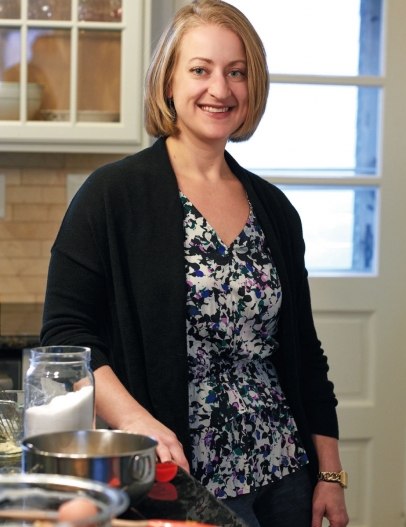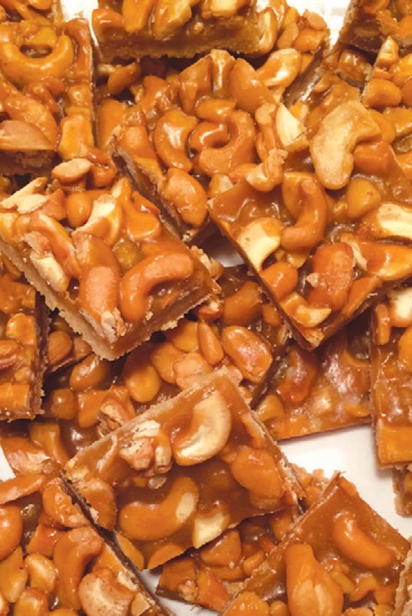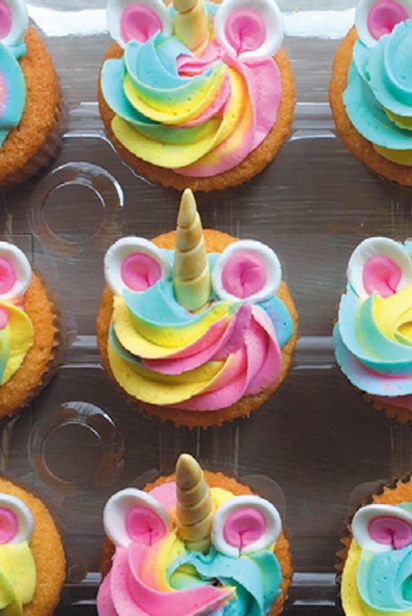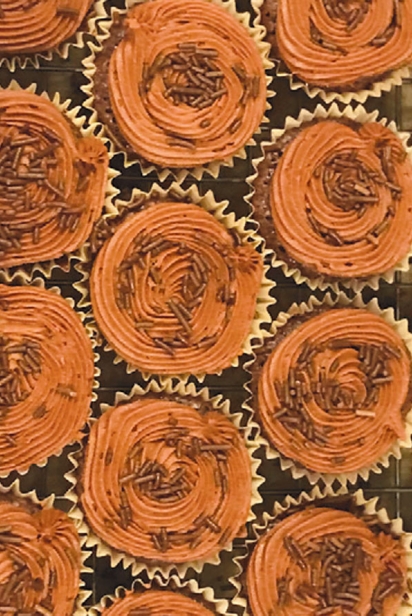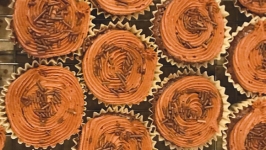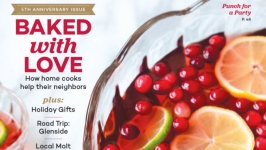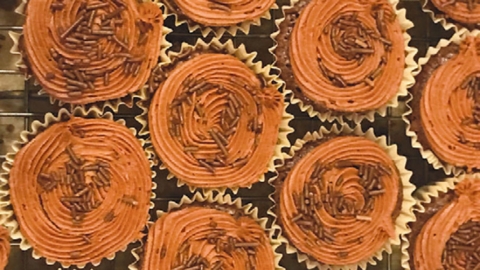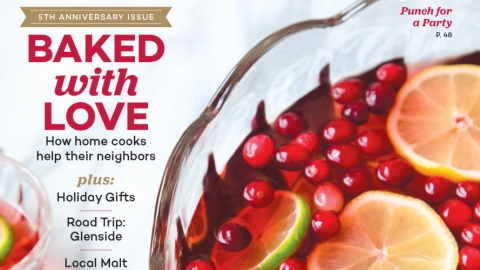InKind Baking Project - Baking a More Welcoming Philly
AS SUNSET TURNED A SNOWY LANDSCAPE electric blue on a January Sunday, Julie Donofrio preheated the oven in her bright South Philly kitchen. This particular day would tie the city’s record for cold at just 4°F, pipes bursting in protest across the city. Undeterred, Donofrio, an urban planner at Penn Praxis, prepared the batter for a batch of cinnamon sugar-puff muffins: pouring milk into a clean white bowl, measuring oil and gently breaking eggs. As the muffins baked, cinnamon perfumed her kitchen.
One could be forgiven the temptation to savor one fresh from the oven. Instead, Donofrio packed them up for delivery to the Nationalities Service Center (NSC), an immigrant and refugee service organization in Center City. There, English as a Second Language (ESL) students from around the globe would enjoy them while working on exercises designed to help them navigate life in their new city: using public transportation, identifying healthy food items in the market.
As a volunteer with the InKind Baking Project, launched in the wake of President Trump’s first travel ban in January 2017, Donofrio is one of more than 400 bakers who believe in the power of small gestures to build a more inclusive Philly. Founded by her friend and colleague at Penn Praxis, Molly Lester, the grassroots group has reached more than 17,000 people through donated baked goods. Along the way, they’ve shared a message of welcome with families experiencing homelessness, immigrants, refugees and victims of sex trafficking, among others.
Lester views the project as a way to counter the turmoil of current events in a simple but tangible way. “The travel ban, plus all the talk about building walls, really made me want to send a different message,” she says. She started with NSC, baking for new refugee arrivals. That relationship soon included baking for NSC’s ESL classes and weekly “Know Your Rights” sessions, which help immigrants understand the legal issues related to their statuses.
“The enthusiasm of the InKind Baking Project’s volunteers for NSC’s work, and the work of the other immigrant- and refugee- serving providers in this city, really encourages us,” says Danielle Bossert, refugee resettlement manager.
NSC makes it a point to let clients know that the baked goods are coming directly from the community. “Even though they don’t know the person who might be baking those goods, they feel really welcomed,” she says. For Donofrio, the admiration is mutual. “I have so much respect for people who are here in this country and trying to learn a new language,” she says. “Just recognizing how hard that is: to work every day, but also take the time out to try to learn a language? Hopefully their day is made a little bit brighter.”
The InKind Baking Project’s recipe works because it remains focused on its mission: to bake as a sign of community and solidarity. Nonprofits and social-service organizations can submit requests for baked goods on the group’s website. In turn, Lester puts out a call for bakers. Folks sign up and, in short order, homemade muffins, cookies or cakes arrive. The goal is for organizations citywide to know that they can make this request, whomever they serve.
A recipe borne of personal conviction
Before the InKind Baking Project started, Lester was unknowingly building its framework by baking as a volunteer for the Salvation Army of Greater Philadelphia’s Red Shield Family Residence on Broad Street. The space serves up to 119 individuals experiencing homelessness. Motivated by a story she had read, Lester asked how she could get involved.
Lester had long baked for friends and family, so baking for strangers felt natural. As the daughter of Presbyterian ministers, she sees community outreach as an extension of her faith. “I wouldn’t say I grew up in an activist house, but those values were definitely instilled in me from my parents. Activism takes many different forms,” she says.
Though Red Shield has a fully operational kitchen that provides three meals and a snack to residents daily, director Kelly Devlin had an idea for how Lester could plug in. “I said to her, ‘We do a monthly birthday club. Would you sign up for that?’ And she did. She was faithful in coming down.” As the InKind Baking Project took shape, Lester was able to involve more volunteers to make birthday cakes and other treats for the residence each month.
Given the challenges such populations are facing, some may wonder how much difference those cakes can really make. The way Devlin sees it, baked goods made from scratch are more than a nice-to-have treat: they can lift spirits. “A lot of times, parents get upset that they can’t provide the home-cooked meals that they’re used to. Having somebody home cook or bake? It reminds them of home,” she says.
Staff members also use the baked goods to spark conversations. “Food is an easy common ground,” Devlin says. “Think about somebody acknowledging you on your birthday. What do those little things mean to you?”
Devlin hopes to see that impulse grow, noting that in a “me-centered” world, organizations like the InKind Baking Project can make a real impact. “The time and attention that they are putting into a gift for someone they don’t know—I am struck by that again and again,” Lester says. She simply hopes that those residents know they are worthy of the time and care.
“I do think that the people who are gravitating toward this [project] are looking for ways to contribute tangibly to the resistance.”
An unexpected lifeline
For social-service organizations with tight budgets, the impulse of strangers to show this kind of support is both unexpected and deeply appreciated.
“We’re a small nonprofit. We have limited resources,” says Debbie Lee, development and communications associate for Women in Transition, a nonprofit that provides counseling and advocacy for women. Gathering food and donations takes up precious time. “The fact that groups like InKind Baking Project exist to provide that warmth? To say ‘We’re here, and you can rely on us’? The fact that people can show up in that way is incredible,” she says.
Women in Transition first talked to Lester in September 2017 while planning an open house to celebrate its new facility. That went over so well that they reached out again for an empowerment poetry night in Germantown called “Amplifying Our Voices.” Designed to raise awareness about domestic violence, the event attracted a mix of current clients and local residents, many of whom shared personal stories as part of an open-mic session.
“There’s no other group like InKind Baking Project out there,” Lee says.
Open to all
As the project evolves, Lester hopes to continue reaching more people. To do that, she continues to welcomes new volunteers, and the organization initiated a new steering committee this fall. Lester is also fundraising, so that those who wish to bake but don’t have the extra cash for ingredients can more easily get involved. In time, she aims to build a toolkit to help other cities model the program.
Looking back to January 2017, Lester is heartened by the interest that her group has generated. “I certainly don’t shy away from the political motivations behind this,” she says. Yet she’s careful not to impose those politics on others. “I don’t want to assume that everybody is in it for that goal. But I do think that, in general, the people who are gravitating toward this are looking for ways to contribute tangibly to the resistance.”
As to what that means from person to person? Lester leaves that up to the bakers. She welcomes people from all walks of life and skill levels, and views the act of putting one’s skills to work for others as a basic community-building exercise. Volunteers like Donofrio echo that sentiment: “We’re going through a learning process right now as a city and as a country that’s uncomfortable at times, but I think it’s daylighting a lot of things that weren’t necessarily talked about before. InKind Baking Project is an example of that. It makes you a more aware citizen, just by doing something that’s not that hard.”
Follow @inkindbakingproject on Instagram for news and baking inspiration
RECIPE FOR A WELCOMING COMMUNITY
Lester offers the following advice to those want to get involved:
Bake with an open mind.
“What I hope we grow toward is equal exchange. Building community relies on mutual sharing.”
Don’t worry about perfection.
“One of the things I’ve learned is that I’m on the lowest rung of bakers. I do it as an amateur, I enjoy that and I’m fi ne with that. I encourage other amateur bakers to sign up as well.”
Include a personalized message.
“It’s a way to demonstrate that not only is the one baker dropping off and extending this message, but that there is a whole coalition of people standing in solidarity with what they’re giving.”
Nourish and be nourished.
“When we build community through food, we nourish more than our stomachs.”


